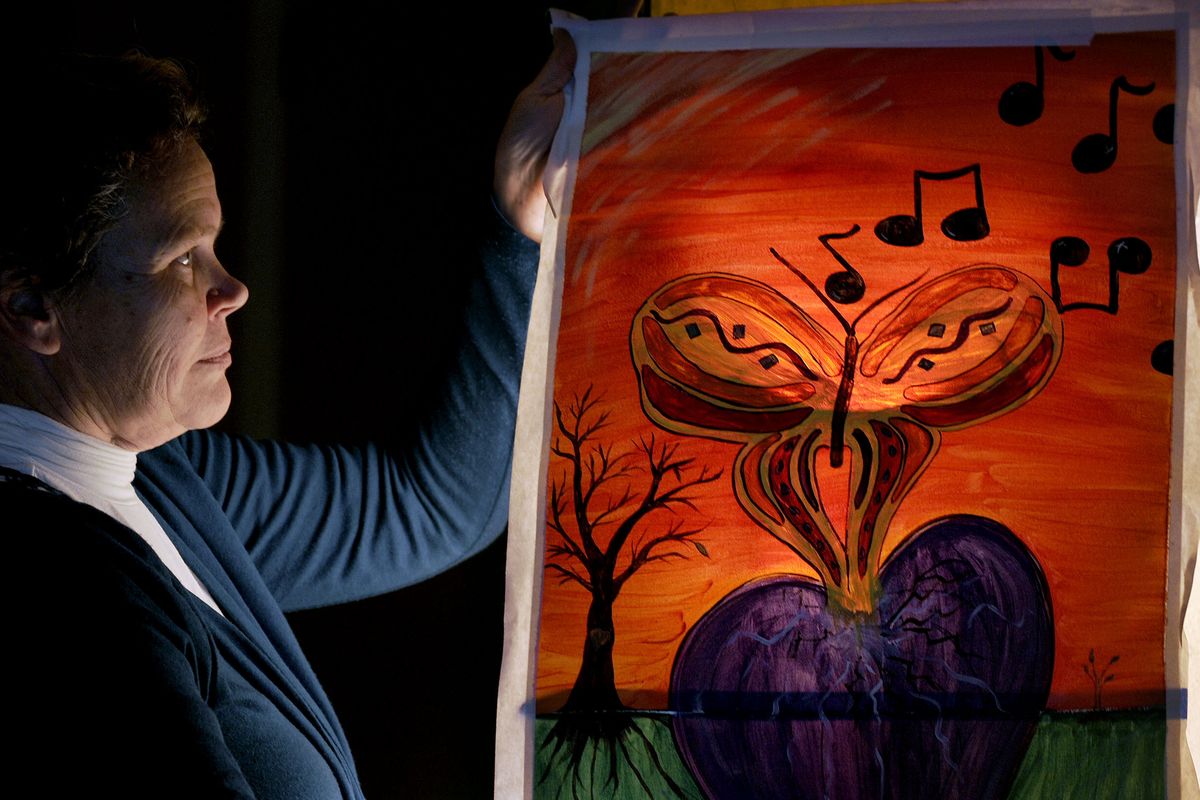Her art’s desire
Coeur d’Alene woman follows her passion and finds a new career path

Leasa Harmon is pursuing a new career guided by advice that may sound illogical, if not reckless, in a job market that remains erratic and scarce of opportunity.
The Coeur d’Alene woman is following her heart instead of choosing one of the paths with the greatest potential for job growth.
Harmon, 51, is taking classes at North Idaho College with the aim of becoming an art therapy specialist working with war veterans, autistic children and at-risk juveniles.
And she’s doing it with a big smile on her face and mounting confidence that she has found her calling.
“The more I open my mind to this, the more avenues are opening up to me,” Harmon said.
It’s the best guidance for anyone at any stage of life as they contemplate career options, said Gail Laferriere, a career counselor and assistant director of Career Services at NIC.
“I really encourage people to start with who you are and what would you do if really you could do anything, even though that seems like dreaming, especially in this economy,” Laferriere said.
Even in a tight job market, graduates and people changing direction mid-career still can find fulfilling and meaningful employment, she said.
“They actually end up finding that even in this very difficult economy, they are able to do work that they enjoy and make a decent living,” Laferriere said. “Those aren’t mutually exclusive.”
For three decades Harmon juggled an assortment of jobs while raising four kids in northeastern Oregon. She opened a restaurant, ran it for a year, and sold it. She started a flower, gift and ice cream shop. She was a medic on an ambulance, went to school to be a massage therapist, and taught anatomy and physiology classes. She pursued her love of painting and kept busy with craft shows and bazaars.
“I’ve done just about anything I could get my hands on and everything everybody else told me I should do,” she said.
The end of a 30-year marriage broke the pattern and prompted Harmon to move to North Idaho in 2010 for a chance to start over. She had long dreamed of college but always doubted she was cut out for it.
Almost a year ago she summoned the courage to walk onto campus and ask about going to school.
“I was shaking so bad I thought I was not going to be able to sign up,” she said. “I got registered and here I am.”
Harmon began at NIC last spring and now is taking art classes – Drawing 101, charcoal, photography. Next semester, she’ll do pottery and oil painting.
Art – a nice hobby but not a career choice, she was told all her life. Then the prospects of what she could do with her abilities came into focus.
Laferriere referred Harmon to TRIO Student Support Services, a federally funded academic assistance program that helps students complete their course of study and transfer to the four-year college or university that best meets their academic and career goals.
Through TRIO and Laferriere’s guidance, Harmon discovered her interests make her well suited for a career that blends art and helping people. Voilà: art therapy, a mental health field that employs creative processes to help people who experience trauma, illness or other challenges.
After earning her associate’s degree, she thinks she’ll enroll at the University of Idaho and work toward a bachelor’s degree in art, then pursue a master’s degree in psychology.
Earlier this week Harmon sat in the student union at NIC, offering candy in exchange for volunteers willing to complete a short questionnaire on art therapy and post-traumatic stress disorder, the mental health condition triggered by a terrifying event.
“I see our country as needing more and more help with our veterans as they are coming home,” she said. “There is such a stigma to any kind of therapy, especially with PTSD right now. … We need to get over this whole idea that getting therapy of any kind means you’re a weak person.”
Pursuing one’s passions, as Harmon is doing, can be a real strength when employers evaluate your qualifications, Laferriere said.
“Figure out what you want the most, because you’re more likely to get hired,” she said.
When she meets with NIC students – an equal mix of recent high school graduates and returning adults – Laferriere does speak about the importance of having a backup plan and looking closely at several options.
But she still advises them to figure out first what they really desire for a career, not necessarily what makes practical sense. From there they can begin to explore market opportunities and pay scales.
“Those who want a sure thing are probably best off learning as much as they can about themselves and having several plans,” she said. “Some of the jobs that are going to exist haven’t been created yet. Who would have dreamed 10 years ago that you would have somebody developing apps for cellphones?”
Harmon said she knows what it’s like to be motivated by financial reward, to chase the paycheck. She’s ready for something more meaningful.
“I’ve just seen so many people in life that are not what we’d consider wealthy, they haven’t followed that path … but they follow their heart and they have a much more fulfilling life.”